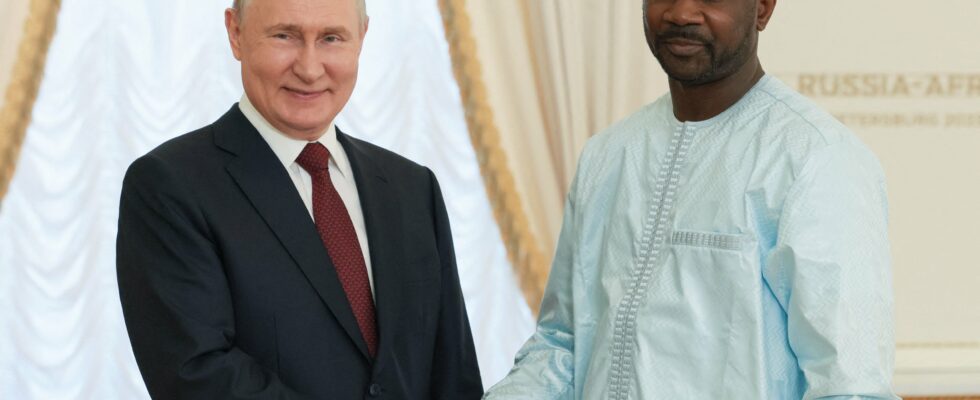This is a bitter setback, which could have wider international repercussions. About ten days ago, the Malian military junta, supported by Wagner’s Russian mercenaries, suffered one of its heaviest defeats in the north of the country. Facing them was an alliance of Tuareg separatists, the CSP-DPA, which claims to have attributed to Wagner “84 countable deaths” and to the FAMAS (Malian armed forces) “47 deaths”. But also jihadist groups who also took advantage of the opportunity to inflict heavy damage on the alliance between the Malian army and Russian soldiers.
But while the military regime of Assimi Goïta, like Wagner, redoubled their press releases to explain this setback, notably attributed to the weather, a statement came to provide them with a justification on a plate: that of the spokesman for Ukrainian military intelligence, Andriy Yusov. On Ukrainian television, he made statements affirming that Kiev’s forces had played a role in this battle largely won by the Tuareg separatists. “The fact that the rebels received the necessary data that allowed them to carry out an operation against Russian war criminals has already been observed by the whole world. Of course, we will not disclose the details. More information to come here too.”
That was all it took for the Malian junta to seize this opportunity. Thus, in a statement published this Sunday, the Malian government claims to have “taken note, with deep shock, of the subversive remarks by which Andriy Yusov, spokesman for the Ukrainian military intelligence agency, confessed to Ukraine’s involvement in a cowardly, treacherous and barbaric attack by armed terrorist groups that resulted in the death of elements of the Malian Defense and Security Forces,” denounced the spokesman for the Malian government, Abdoulaye Maïga.
Adding that in their eyes, these acts “violate the sovereignty of Mali, go beyond the framework of foreign interference, and constitute support for international terrorism”, the latter therefore announced that they were breaking off their diplomatic relations with Ukraine. A choice that Ukraine castigated, denouncing a “short-sighted and hasty” decision.
“The neo-Nazi and villainous nature of the Ukrainian authorities”
These statements by the Malian government are in line with the great rapprochement of Assimi Goïta’s military junta with Russia since it took power in 2022. The latter had chosen to completely break with the old alliance with France and its European partners to turn militarily and politically towards Russia.
The rest of the Malian government’s statement leaves little doubt about the Assimi Goïta regime’s stated desire to get even closer to Moscow, repeating the Kremlin’s most outrageous language towards Kiev. The latter thus affirmed that they adhered “totally to the diagnosis established by the Russian Federation, which has nevertheless warned the world for years about the neo-Nazi and villainous nature of the Ukrainian authorities, now allies of international terrorism, far from the aspirations of peace and stability of the Ukrainian people.”
In addition to Mali, these statements by the Ukrainian intelligence spokesperson have sparked anger in another country in the region: Senegal, governed since last April by Ousmane Sonko. This Saturday, the new Senegalese authorities indicated that they had summoned the Ukrainian ambassador in Dakar, the latter having republished on the social network X the comments of the Ukrainian intelligence spokesperson about the conflict in Mali. “Consistent in its position of constructive neutrality in the Russian-Ukrainian conflict, Senegal cannot tolerate any attempt to transfer to its territory the media propaganda underway in this conflict,” declared the Senegalese Ministry of Foreign Affairs in a statement.
“We have ties with the Ukrainians”
kyiv, a mere scapegoat for the crushing defeat of the Malian army and Wagner’s forces or a real stakeholder in the conflict in the Sahel? While their forces have probably not drastically upset the balance of power in a region where the separatists have always inflicted significant damage on their adversaries, there is little doubt that Ukrainian intelligence seems to have collaborated with them. In addition to Yusov’s rather unequivocal remarks, kyiv’s support was confirmed by a spokesperson for the Tuareg military alliance of the CSP-DPA, Mohamed Elmaouloud Ramadane., in the columns of the World“We have ties with the Ukrainians, but we have ties with everyone, French, Americans and others,” he says.
The French newspaper also claims that beyond intelligence exchanges, Tuareg rebels were also trained by Ukrainian secret services in the use of homemade explosive drones, a weapon highly prized by Kiev’s forces in its war against Russia. One last piece of evidence is clear: on Monday, July 29, the Ukrainian newspaper The Kyiv Post thus relayed an exclusive photo of a group of Tuareg rebels posing with a Ukrainian flag, following their victory against Wagner’s forces.
kyiv’s desire to counter Russia in Africa
This desire to combat the influence of Wagner’s Russian paramilitaries does not stop in Mali. Ukrainian forces had also been spotted in Sudan at the end of September to combat the Russian paramilitaries present near the capital Khartoum, as explained The Express. Still according to the Kyiv PostUkrainian forces are also said to have provided military support to Syrian rebels in order to combat Russian paramilitaries, associated with the Bashar al-Assad regime.
But Africa seems to remain a diplomatic priority for Volodymyr Zelensky and Ukraine, which announced the opening of no fewer than six embassies on the continent last spring, in Côte d’Ivoire and the Democratic Republic of Congo, but also in Ghana, Botswana, Mozambique and Rwanda. Ukrainian Foreign Minister Dmytro Kouleba began his fourth diplomatic tour of Africa in Malawi on Monday, August 5, while he will also visit Zambia and Mauritius. This is a sign that the fight between Russia and Ukraine in Africa is not primarily military, but above all a question of influence to secure support on the international scene.
